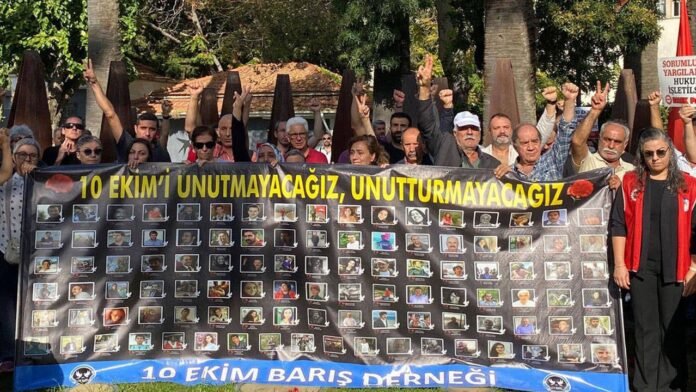A Turkish appeals court has upheld a lower court’s acquittal of an Islamic State in Iraq and the Levant (ISIL) suspect on the charge of crimes against humanity in the bombing of an Ankara train station in 2015, drawing fierce criticism from victims’ families, who accuse the judiciary of shielding state complicity, the BirGün news website reported.
The Ankara Regional Court of Appeals finalized its decision Monday, ruling that the acquittal of Erman Ekici was consistent with Turkish legal procedure. The court rejected an appeal from victims’ lawyers on procedural grounds, arguing that the families of the 103 people killed in the twin suicide bombing were not “directly harmed” by that specific charge and therefore had no standing to contest the ruling. Crucially, the appeals court did not evaluate whether the attack met the legal threshold for crimes against humanity.
The decision drew immediate backlash from the October 10 Massacre Lawyers Commission, which represents victims and their families. In a written statement the group said the ruling was part of a wider effort to prevent accountability for state institutions and political leadership that may have enabled the massacre through negligence or complicity.
“The court once again attempts to obscure the role of political power in enabling the attack,” the commission said. “This decision reinforces a judicial system that refuses to acknowledge ISIL as a perpetrator of crimes against humanity and that systematically avoids investigating the real actors behind the atrocity.”
The group cited numerous pieces of evidence presented during the nearly decade-long legal process, which they say pointed to failures or omissions by Turkey’s National Intelligence Organization (MIT), the Ministry of Interior and law enforcement officials in cities like Gaziantep, Adana and Kilis, where ISIL activity was allegedly monitored but not stopped.
The commission also criticized the court for overlooking politically sensitive findings, including claims that the attack’s timing, just weeks ahead of the November 2015 general election, served to destabilize the country in a way that benefited the ruling Justice and Development Party (AKP). A previous court ruling had noted that the attackers sought to create chaos and fear, targeting not just civilians but the democratic order of the Turkish Republic itself.
The bombing took place on the morning of October 10, 2015, at Ankara’s central train station, where thousands had gathered for a peace rally organized by trade unions, civil society groups and the pro-Kurdish Peoples’ Democratic Party (HDP). The demonstration, just weeks ahead of a snap general election, called for an end to violence between Turkish forces and the outlawed Kurdistan Workers’ Party (PKK), which Turkey and its Western allies designate as a terrorist organization and was seen as critical of the ruling AKP.
Two ISIL suicide bombers detonated their explosives within seconds of each other in the middle of the crowd. The explosions killed 103 people and wounded more than 500, with body parts scattered across the square. Dozens died instantly. Many more succumbed to injuries in hospitals in the following hours and days.
The Ankara 4th High Criminal Court, which oversaw the main trial, sentenced 10 suspects in July 2024 for various crimes related to the attack, including murder and aiding a terrorist organization. However, the court acquitted key defendant Ekici on the charge of crimes against humanity, stating that the attack, while brutal, did not meet the legal criteria of a “systematic attack against a civilian population.”
Lawyers for the victims say they intend to take the case to the European Court of Human Rights (ECtHR), arguing that Turkish courts have failed to provide an effective remedy and have violated victims’ rights under Article 2 of the European Convention on Human Rights, which guarantees the right to life and requires thorough investigation in cases of mass killings.
The 2015 bombing continues to cast a shadow over Turkish politics. Every October 10, families of the victims gather at the site of the attack to demand justice. They say Monday’s ruling is yet another attempt to close the file without addressing the underlying truths.
“The bombing was not only an act of terrorism,” said one relative of a victim. “It was the outcome of a political climate that allowed it to happen. Now they want to bury not just the victims but the facts.”















